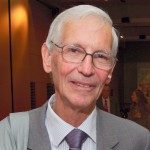Link to Pubmed [PMID] – 15369676
Cell 2004 Sep;118(6):781-94
Reactive oxygen species (ROS) are implicated in the pathophysiology of various diseases, including cancer. In this study, we show that JunD, a member of the AP-1 family of transcription factors, reduces tumor angiogenesis by limiting Ras-mediated production of ROS. Using junD-deficient cells, we demonstrate that JunD regulates genes involved in antioxidant defense, H2O2 production, and angiogenesis. The accumulation of H2O2 in junD-/- cells decreases the availability of FeII and reduces the activity of HIF prolyl hydroxylases (PHDs) that target hypoxia-inducible factors-alpha (HIFalpha) for degradation. Subsequently, HIF-alpha proteins accumulate and enhance the transcription of VEGF-A, a potent proangiogenic factor. Our study uncovers the mechanism by which JunD protects cells from oxidative stress and exerts an antiangiogenic effect. Furthermore, we provide new insights into the regulation of PHD activity, allowing immediate reactive adaptation to changes in O2 or iron levels in the cell.
